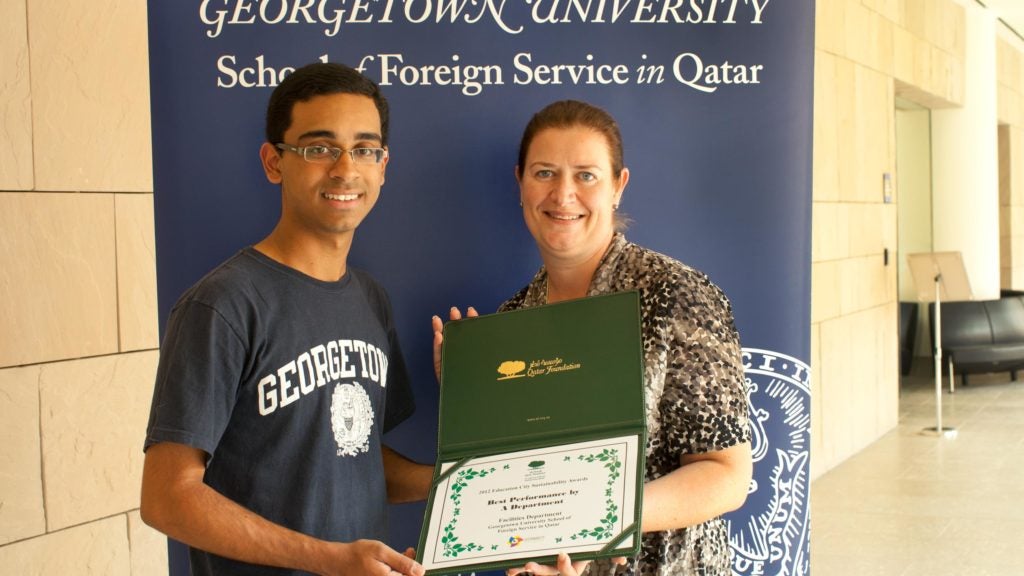Georgetown University SFS-Q Charts a New Course in Environmental Sustainability

Georgetown University School of Foreign Service in Qatar (SFS-Q) is plowing a new wave of change in corporate social responsibility (CSR) and contributing to the further development of Education City and Qatar as a whole. In line with the environmental targets of Qatar’s National Vision for the year 2030, SFS-Q has instituted a series of environmental sustainability directives, which will help the university and its staff, faculty and students contribute to the global shift in ‘green’ consciousness.
Recently recognized by Qatar Foundation for these efforts with a 2012 QF Sustainability Education award for Best Performance by a Department, SFS-Q’s Facilities Management department is pressing ahead with its efforts to create an institutional culture compatible with the long-term health of the planet. “Georgetown University School of Foreign Service’s Facilities Management Department is honored to be recognized by Qatar Foundation in their 2012 Sustainability Awards as Best Department. The team has worked hard this year to launch various initiatives to implement environmental schemes and raise awareness, and so it is great to be acknowledged in this way. We are keen to continue with this valuable work in the coming year in partnership with the Georgetown SFS-Qatar and Education City community,” said Clare Wait, Director of SFS-Q’s Facilities Management department.
Among these efforts is a plastic water-bottle reduction program. Member institutions of Qatar Foundation usually provide two water bottles per employee per day; under its new program, while maintaining SFS-Q’s provision of hydration necessary in Doha’s desert temperatures, each SFS-Q employee can now receive a tall glass of fresh water at their desk each morning. This will reduce the number of plastic waste products entering the unique ecosystem of the region, eliminate unnecessary plastic waste production, and move SFS-Q toward its goal of complete environmental sustainability.
Wait describes their work as ‘wholistic’. “We try to look at the issue wholistically and approach it from a variety of angles”, she added.
Additionally, Georgetown SFS-Q will be phasing in a plastic recycling and composting program in the near future. In partnership with Qatar Foundation, Georgetown University SFS-Q will lend the institutional and infrastructural support needed to make the program a wider success. Supplementary material will be added to the waste food products from the used-horse bedding at Al Shaqab stables, creating a nutritionally dense mulch. Composting re-infuses soil used in food production with the essential nutrients that human beings need; as part of a fully realized approach to environmental sustainability, composting will be an important plank of SFS-Q’s program moving forward.
Energy-efficient lighting has recently been installed in all floor lighting systems at SFS-Q, effectively reducing energy consumption. Paper recycling programs have been underway since April 2011, diverting significant amounts of used office supplies from Qatar’s landfills to serve a variety of repurposing functions. Water conservation measures at SFS-Q have been designed to reduce Qatar’s record-setting water consumption of 800 liters per capita.
These are some of the most ambitious projects taking place at Georgetown SFS-Q in its aim to contribute to a brighter, cleaner future for Qatar and the globe, but they are only the beginning of a more in-depth timetable for a gradual reduction of SFS-Q’s ecological footprint. As a flagship institution for environmental sustainability projects in Qatar Foundation and the region, Georgetown SFS-Q has been the test market for many environmental projects in Qatar –the encouragement of carpooling and paperless staff meetings, the use of rechargeable batteries and opt-out functions for junk mail, along with the creation of a No Car Day are all a part of SFS-Q’s planned next steps in achieving the delicate balance of sustainability.